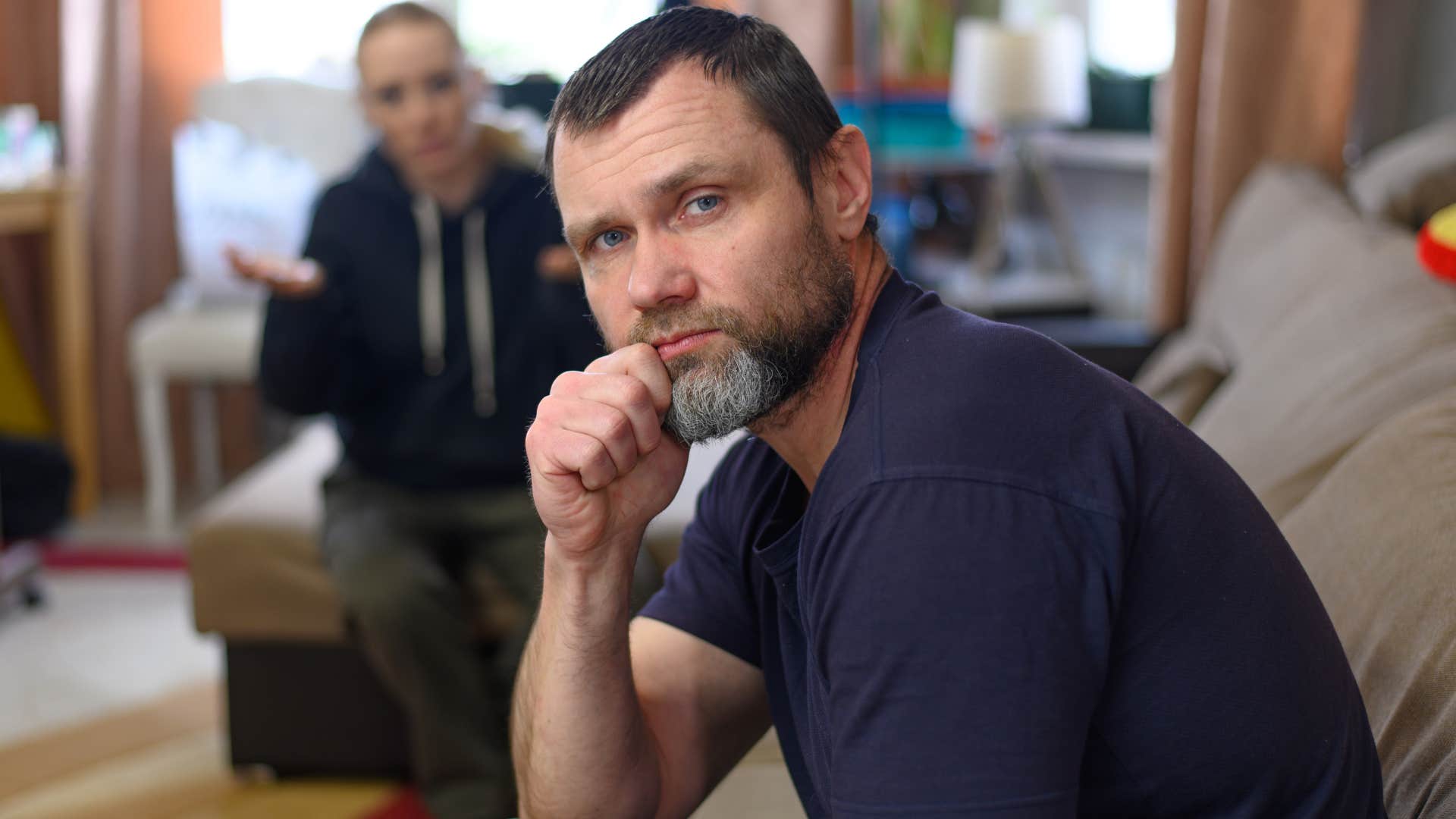10 Things Husbands Don't Realize They Do To Make Their Wives Feel Unloved
These unsuspecting behaviors can spark resentment in the healthiest of marriages.
 Dean Drobot | Shutterstock
Dean Drobot | Shutterstock Resentment can grow untethered, especially in long-term relationships and marriages, even when sparked by seemingly mundane and insignificant passing moments and behaviors. According to a study from the BMS Women’s Health journal, this experience isn’t just explained by partner dissatisfaction but by a phenomenon researchers coin as “marital burnout.”
Many partners feel unsupported and disconnected in their marriages without healthy structures for support and communication, even when they don’t seem necessary early on. Specifically, there are many things husbands don’t realize they do to make their wives feel unloved, especially as conflicts, resentment, and transitional life changes pop up without warning.
Here are 10 things husbands don’t realize they do to make their wives feel unloved:
1.He stops planning dates.
 Perfect Wave | Shutterstock.com
Perfect Wave | Shutterstock.com
According to a report from the Marriage Foundation, married couples who go on occasional planned date nights boast higher satisfaction and happiness in their relationships than those who don’t. Especially when they’re activity-focused or urging couples to try something new, these planned date nights carve out space for couples to focus on themselves rather than the constant life struggles, chaos, and burdens that plague their daily lives.
Often, it’s not intentional when a partner forgoes planning dates to the same degree they did early in the relationship, but it still has harmful effects. Both husbands and wives want to feel pursued, understood, and valued in their connections, but life can get in the way. Planning dates and prioritizing that separate time can help spark more natural and open conversations and, of course, the intimacy everyone is yearning for.
2.He doesn't make eye contact during conversations.
 DimaBerlin | Shutterstock.com
DimaBerlin | Shutterstock.com
Especially after a stressful week or a long day, couples tend to relax in each other’s company, whether reading, watching a TV show, or lying in bed together. In these same moments, many couples also talk for the first time all day, bringing up concerns, discussing their days, and expressing emotions.
Many partners, women specifically, tend to voice concerns about active listening in these moments — generally feeling unheard by their partner when they’re unwilling to make eye contact or look away from the TV.
According to a 2016 study published by the Cambridge University Press, eye contact might seem insignificant or unnecessarily formal with a close partner. Still, its benefits to healthy conversation and strong bonds are impossible to ignore. Not only are people unable to determine if they’re being heard or understood without it, eye contact also helps to spark intimacy and connection in partners through simple conversation.
3.He avoids helping around the house.
 Fizkes | Shutterstock.com
Fizkes | Shutterstock.com
According to a Gallup study, despite working the same amount of hours (and sometimes more) in their relationships, women are still burdened with most household labor, childcare, and chores compared to their male partners. This resentment, built into what seem to be unwritten social rules, can contribute to a collective feeling of unappreciativeness that many women feel in their marriages.
Alongside an already unequal distribution of household work, many women also report their husband’s weaponized incompetence even further isolates them from a supportive environment at home. Not only are they not picking up extra chores or helping to support their wives on difficult or stressful days, but they're often feigning ignorance of the responsibilities they do have.
4.He over-schedules himself.
 New Africa | Shutterstock.com
New Africa | Shutterstock.com
While it’s surprising to many couples, a great deal of conflict in marriages is reportedly “scheduling conflicts,” where one partner agrees to something on a day they’re already booked up. It might seem like an easy fix, with simple communication or even a Google Calendar, yet it remains a sore spot for many couples in their daily lives.
When their husbands passively agree to an event or to help someone else, they inadvertently sign their partner up, often without notice. This lack of basic communication can spark resentment, leaving women feeling unsupported and generally disconnected in their marriages.
5.He doesn't express gratitude.
 Cast Of Thousands | Shutterstock.com
Cast Of Thousands | Shutterstock.com
According to a Harvard Health study, expressing gratitude in your relationships and daily life can make you happier, even if it’s for something simple. Despite its simplicity, many women feel unsupported and unappreciated in their marriages, while their husbands may feel a sense of entitlement.
Even though it’s become a routine to do household chores, make coffee for your partner, or go out of your way to surprise them on a hard day, that doesn’t mean it’s still not worthy of gratitude. By channeling a sense of entitlement in our marriages, we only introduce resentment and ungratefulness into our lives.
6.He's overly critical or ‘nit-picks'.
 Olena Yakobchuk | Shutterstock.com
Olena Yakobchuk | Shutterstock.com
An unhappy or disconnected marriage can often spark feelings of resentment that cause both partners to repress their emotions and avoid open communication. This unresolved conflict, lingering under the surface of everyday interactions, can manifest as condescending language or the tendency to be overly critical of each other.
Women who notice this tendency in their partners generally feel unhappier in their relationships, and often, according to mental health expert Paul Hokemeyer, they experience physical symptoms like exhaustion, fatigue, and insomnia in response to the behavior. It’s this “marital burnout,” sparked by several behaviors, that leaves women feeling both unloved and emotionally, mentally, and physically drained in their yearning for connection.
7.He's constantly sarcastic.
 Motortion Films | Shutterstock.com
Motortion Films | Shutterstock.com
Contempt in a partnership is generally a sign that your marriage is in trouble, at least according to family relations expert Robin Milhausen, mainly if it’s manifesting through disconnected body language and sarcasm. While healthy amounts of playfulness and irony can be helpful in a relationship, regularly communicating with your partner in cruel and hurtful ways isn’t doing anyone any favors.
As Milhausen argues, this contempt sometimes stems from a more serious marital conflict, like secrecy or infidelity, that hasn’t come to the surface yet and has only been subtly sabotaging a couple’s healthy dynamic.
8.He doesn't openly talk about his physical wants and needs.
 Violator22 | Shutterstock.com
Violator22 | Shutterstock.com
According to licensed psychologist Steven D. Graham, unwillingness is the number one barrier to a healthy dynamic in a relationship and, more specifically, healthy communication. You don’t have to be physically intimate every day or constantly talk about it to maintain a healthy routine, but you do have to be on the same page with your partner.
How often should physical intimacy be prioritized? Are there barriers to intimacy affecting one or both partners? Is there a reason or feeling keeping one partner from being intimate? Communication is always at the root of marital dilemmas, and to feel loved in a partnership, these uncomfortable and sometimes awkward conversations need to happen.
9.He stops fighting.
 bbernard | Shutterstock.com
bbernard | Shutterstock.com
The Center for Couples Counseling argues that conflict and arguments in a marriage aren’t always harmful. They can be incredibly beneficial to maintaining a healthy balance, expressing emotions, and resolving situations that could spark resentful feelings if left unaddressed. They give couples an avenue to voice their concerns, address them, and move forward if they’re dealt with in fair and healthy ways.
However, a partner who avoids conflict or stops arguing in their marriage isn’t one without emotional struggles or concerns; they’re just someone who’s choosing to disregard or dismiss them for a variety of reasons. Many women feel burdened with “sparking conflict” in their marriages for this reason—they need to express their emotions and work through things, but their partner turns to the defensive or feels “attacked.”
Not all conversations and communication will feel comfortable, and that’s not a sign of an unhealthy marriage but rather a productive one.
10.He equates unhappiness with failure in the relationship.
 Puhhha | Shutterstock.com
Puhhha | Shutterstock.com
Not every marriage is meant to last forever, and that’s okay, but equating unhappiness or dissatisfaction with “failure” doesn’t spark growth in couples committed to staying together and working through their issues.
Many women experience feelings of hopelessness or disconnect in response to this misguided narrative in their husbands — especially when they’re unmotivated to engage in open conversations and try new methods for growth like therapy, scheduled dates, or planned check-ins with each other.
Zayda Slabbekoorn is a staff writer with a bachelor’s degree in social relations & policy and gender studies who focuses on psychology, relationships, self-help, and human interest stories.

